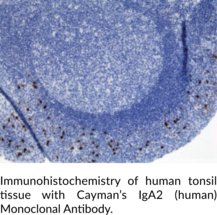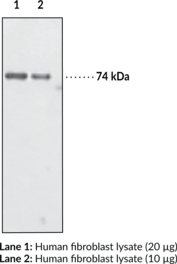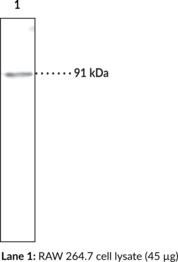Description
Immunoglobulin A (IgA) is a member of the immunoglobulin superfamily of glycoproteins with roles in host defense against intestinal pathogens and both quantitative and qualitative control of host commensal microbiota composition.{53918,53919} Human IgA consists of two identical light chains of approximately 25 kDa each, as well as two heavy chains of approximately 60 kDa each that contain C-terminal extensions, known as tailpieces, which allow for IgA oligomerization.{53927,53925} There are two IgA subclasses, IgA1 and IgA2, which are encoded by IGHA1/α1 and IGHA2/α2, respectively, and have differences primarily in the hinge and heavy chain constant regions.{53925} IgA is produced by B cells and later secreted by plasma cells and is the most abundant antibody on mucosal surfaces that comprises at least 70% of all Ig produced in mice.{53918,53919} Monomeric IgA1 is predominant in the serum, but dimeric secretory IgA (SIgA) is the predominant form in mucosal surfaces and secretions with the ratio of subclasses varying based on the IgA-secreting cell types present.{53925,53921} Dimeric and polymeric IgA bind to Igα Fc receptor I (FcαRI) and the IgM- and IgA-binding high affinity Igα and Igµ Fc receptor (Fcα/µ-R), which are both involved in mediating immune responses.{53921,53922} Production of IgA is induced in the gut only in animals containing intestinal microbes, and the number of IgA-producing plasma cells is reduced in germ-free mice.{53918} IgA levels are increased in certain gastrointestinal tract and liver diseases, with IgA2 levels increased to a higher degree than IgA1 levels in patients with Crohn’s disease and alcoholic liver disease.{56183} Cayman’s IgA2 (human) Monoclonal Antibody can be used for ELISA, immunocytochemistry (ICC), and immunohistochemistry (IHC) applications.
Synonyms: Immunoglobulin A2
Immunogen: Human IgA2
Formulation: 100 µg of protein A-affinity purified monoclonal antibody
Isotype: IgG
Applications: ELISA, ICC, IHC
Origin:
Stability: 365 days
Application|ELISA||Application|Immunocytochemistry||Application|Immunohistochemistry||Product Type|Antibodies|Monoclonal Antibodies||Research Area|Cardiovascular System|Blood|Serum Proteins||Research Area|Immunology & Inflammation|Adaptive Immunity||Research Area|Immunology & Inflammation|Gastric Disease|Crohn’s Disease



